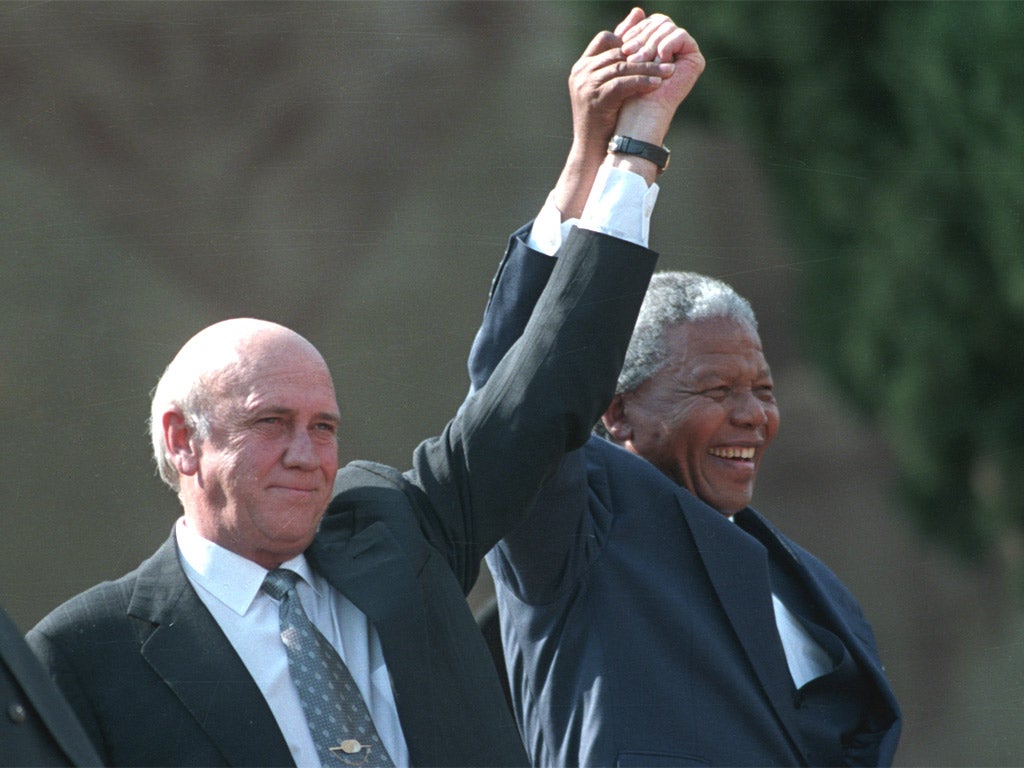Outrage at De Klerk's defiance on apartheid
South Africa’s last white leader appears to defend policy of segregating racial groups

Your support helps us to tell the story
From reproductive rights to climate change to Big Tech, The Independent is on the ground when the story is developing. Whether it's investigating the financials of Elon Musk's pro-Trump PAC or producing our latest documentary, 'The A Word', which shines a light on the American women fighting for reproductive rights, we know how important it is to parse out the facts from the messaging.
At such a critical moment in US history, we need reporters on the ground. Your donation allows us to keep sending journalists to speak to both sides of the story.
The Independent is trusted by Americans across the entire political spectrum. And unlike many other quality news outlets, we choose not to lock Americans out of our reporting and analysis with paywalls. We believe quality journalism should be available to everyone, paid for by those who can afford it.
Your support makes all the difference.Many Afrikaners in South Africa have no doubt about who is the great volksverraaier, the traitor of the race: it is F W De Klerk, the National Party prime minister jointly awarded the Nobel Prize with Nelson Mandela after renouncing apartheid.
His famous U-turn led directly to the abolition of the 'bantustans' or African homelands and the creation of the unitary 'Rainbow Nation.'
But was his heart in it? In an interview this week, Mr De Klerk, now 76, controversially insisted that he still believed in the 'bantustan' policy which he did more than anyone to dismantle. Was it true, CNN’s Christiane Amanpour asked him, that he had never renounced the principle of apartheid?
De Klerk replied: “I have made the most profound apology in front of the Truth [and Reconciliation] Commission and on other occasions about the injustices wrought by apartheid.”
In comments that sparked outrage in South Africa, he added: “What I haven't apologised for is the original concept of seeking to bring justice to all South Africans through the concept of nation states.”
The former prime minister was referring to the bid by his predecessor Hendrik Verwoerd to consolidate the position of whites in South Africa by creating some ten 'bantustans' or black African homelands. Some, like KwaZulu, had a basis in existing economic and political realities and identities, but most were reverse-engineered into existence after Verwoerd sent teams of anthropologists out into the bush to identify territories with distinctive dialects, then declared them to be homelands which could aspire to full independence.
The catch, for the blacks, was that having been allocated a homeland, one no longer had the right to reside in the 80-plus per cent of South Africa that remained exclusively in the hands of the whites. The allocation of a bantustan was often arbitrary, as millions of blacks belonged to the thoroughly mixed, urbanised and industrialised populations of South Africa's cities. In this process, 3.5 million black South Africans were forcibly expelled to their 'homelands'.
Mr De Klerk's stout defence of what was known as Verwoerd's 'grand apartheid' provoked irritation and disappointment but little surprise in South Africa. Lindiwe Mazibuko, leader of the opposition Democratic Alliance, said the remarks were “unfortunate and disappointing.”
“While Mr De Klerk rightfully acknowledges that Apartheid was morally indefensible, he...must recognise that the entire concept of racial division through 'separate but equal' bantustans was an insult to the dignity of black South Africans and an affront to the most basic principles of justice and equality,” she added. Twitter also buzzed with angry reactions.
In the interview, Mr De Klerk acknowledged the injustice on which the bantustan policy was founded, and said that was one of the reasons for the system's collapse. “Whites wanted to keep too much land for themselves,” he said.
But he revealed that he had never discarded the vision of separate development that animated the National Party in his youth and in which 'grand apartheid' was compared to the process of post-colonial nation building in places such as India. “What drove me as a young man,” he said, “...was a quest to bring justice for black South Africans in a way which would not...destroy the justice to which my people were entitled.”
Today, the only place in South Africa where Afrikaners live out that ideal of racial justice is the town of Orania, in Northern Cape province, where the exclusively white population, around 500 in number, live Amish-like lives, doing all manual work themselves. The town has its own flag, which shows a white boy rolling up his sleeves.
Join our commenting forum
Join thought-provoking conversations, follow other Independent readers and see their replies
Comments